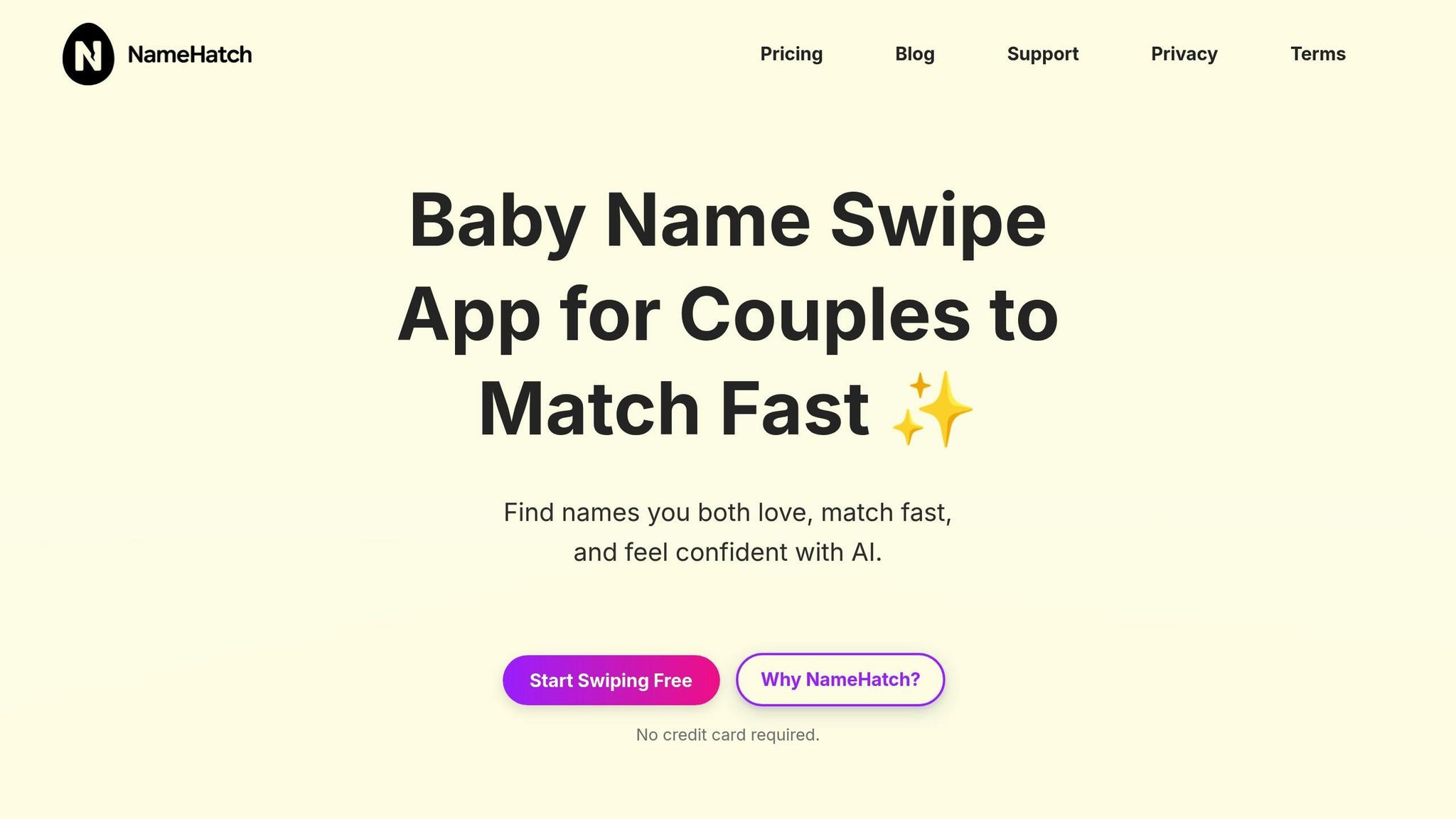AI is transforming how families make decisions and manage parenting responsibilities. From automating schedules to offering real-time insights, AI tools are helping parents collaborate more effectively, reducing conflicts and improving communication. Here’s what you need to know:
- What’s Changing: AI tools now assist with shared parenting tasks like expense tracking, tone monitoring, and educational planning.
- Adoption Growth: The AI parenting market is projected to grow to $35.2 billion by 2034, with 70% of parents reporting AI use in schoolwork and daily routines.
- Key Benefits: AI simplifies decision-making, saves time, and reduces emotional strain in co-parenting. Tools like NameHatch even make baby name selection easier.
- Challenges: Privacy concerns, algorithmic bias, and over-reliance on AI are critical issues. Parents must balance technology use with maintaining human connections.
- Future Outlook: Emerging AI developments, such as multimodal systems and specialized assistants, promise even more personalized and intuitive tools for families.
AI is reshaping parenting dynamics, offering tools to streamline tasks and enhance collaboration. However, thoughtful use is essential to preserve the human element in parenting.
Recent Research and Current Trends
Key Research Findings on AI and Collaborative Parenting
Recent studies conducted between 2023 and 2025 highlight how AI is transforming collaborative parenting in American families. One survey involving 92 parents examined nine future-focused scenarios where AI supports parenting, revealing a mix of enthusiasm and skepticism about its role in family decision-making.
The findings are striking: 86% of students have used AI for academic purposes, while 70% of teenagers have interacted with AI chatbots. Among parents, 80% have relied on AI chatbots, and 44% use AI to assist with homework. These numbers reflect how deeply AI has become woven into family routines and the way decisions are made collectively.
Research also points to how conversational AI can simplify parenting tasks, such as automating routine activities and tracking technology usage. AI is showing promise in improving co-parent communication, offering real-time feedback, and enhancing family dynamics. These findings provide a foundation for understanding how AI is influencing parenting tools today.
However, the research also raises concerns. Some parents worry that AI could undermine their authority, reduce meaningful human interaction, and even encourage what some researchers call "lazy parenting". On the other hand, when thoughtfully implemented, technology has been shown to support parent-child interactions, promote well-being, and strengthen family dynamics.
Current Trends in AI-Driven Parenting Tools
Building on these insights, AI tools have become an integral part of daily family life. Over the past two years, 30% of parents with children aged 0–8 have used AI for educational purposes, signaling a shift in how families approach shared responsibilities and decision-making.
Latina mothers in the U.S. are increasingly adopting AI tools, particularly for bilingual language development and managing household chores. The education sector has also seen robust adoption. For instance, 54% of students report improved engagement and motivation in their coursework thanks to AI tools, while 60% of teachers regularly incorporate AI into their teaching methods.
"If the communication is not directly connected to their child, parents often ignore it. A lack of personalization in communications with students and parents can lead to disengagement."
– Nataliya Polyakovska, Principal AI Tech Consultant, SoftServe
One emerging trend is AI acting as a mediator in parent-child relationships. While it can streamline communication, it has also sparked concerns. Some children may begin to trust AI more than their parents, creating new tensions. On a positive note, AI is helping digitally literate families share parenting responsibilities more equally between mothers and fathers.
Government and Research Support for AI in Parenting
As AI tools continue to evolve, government and research organizations are stepping up to support families in navigating this new landscape. The U.S. government and institutions like the National Parents Union (NPU) emphasize the need for families to understand AI to engage fully in decisions about their children's education. This reflects growing awareness that families with AI knowledge are gaining an edge, while others may fall behind.
Research efforts are addressing the digital literacy gap between parents and children, aiming to prevent over-reliance on AI for guidance. Government-backed studies are also exploring how AI adoption intersects with cultural norms and socio-economic challenges.
Educational policymakers are introducing new guidelines to ensure transparency in AI use within schools. For example, schools are encouraged to clearly communicate when messages are AI-generated to build trust and help families differentiate between automated systems and human educators. Teachers are also receiving training on how to use AI responsibly, including crafting effective prompts, recognizing biases, and verifying information accuracy.
Community trust and school innovation are increasingly tied to how well families are integrated into AI adoption efforts. With over 60% of parents of children in grades K–8 struggling to help with homework and 25% feeling too busy to provide support, government programs are stepping in. These initiatives aim to equip families with the tools and knowledge they need to use AI effectively in collaborative parenting decisions.
AI-Powered Decision-Making Tools for Families
Overview of AI Tools for Parenting Decisions
AI tools are reshaping how families make decisions together by analyzing data and user preferences to provide practical insights. These tools simplify complex parenting choices, making the process more collaborative and informed. Platforms like NameHatch and other decision-making aids highlight how technology is becoming an integral part of modern parenting.
The numbers tell a compelling story: the global smart baby monitor market was valued at $1.2 billion in 2023 and is expected to surpass $2.5 billion by 2030. Meanwhile, the broader AI parenting market could grow to $20 billion within the next decade. These tools go beyond simple suggestions - they analyze family dynamics, preferences, and communication styles, offering tailored solutions almost instantly. Some even detect emotional cues through voice, facial expressions, or text, helping families better understand each other and fostering empathy.
Take the Mesquite Independent School District in Texas, for example. In 2020, they launched AYO, a generative AI platform designed to personalize education. AYO uses student data to create detailed profiles and recommend family engagement activities like local events and certification classes. Teachers can share reports on student performance, making communication with parents more focused and effective.
NameHatch for Baby Name Discovery

One standout example of AI’s practical application in parenting is NameHatch, a platform designed to help expectant couples choose the perfect baby name.
NameHatch makes the naming process fun and interactive with its swipe-based discovery system. Couples can explore curated name suggestions individually, and it generates personalized recommendations. It also offers smart filters with categories like Classic, Modern, Nature-Inspired, and Mythical to help narrow down options. The partner matching feature takes it a step further, sending real-time alerts when both partners like the same name, cutting down on lengthy debates and making the process smoother.
How AI Tools Improve Collaboration
AI tools like NameHatch go beyond specific tasks to improve overall family communication and collaboration. By reducing misunderstandings and simplifying co-parenting, these tools help families work together more effectively. Research shows that 76% of users believe AI introduces new ways to communicate, and 69% say AI has had a positive impact on family interactions.
These platforms excel at producing neutral, clear messages that save time and lower stress - especially valuable for busy parents, 25% of whom feel they don’t have enough time to support their children as much as they’d like. With predictive analytics, AI can spot potential issues early, while sentiment analysis ensures communication remains respectful and constructive.
One of AI’s standout features is its ability to provide empathetic responses, which can help de-escalate conflicts. While traditional conflict resolution methods remain essential, AI offers an additional layer of support that’s accessible 24/7. Experts suggest integrating AI tools into regular family discussions and balancing their insights with traditional approaches to maintain the human connection that’s so vital in co-parenting.
Impact of AI on Family Dynamics and Decision Processes
Better Efficiency and Less Conflict
AI tools are reshaping how families communicate and make decisions, offering practical solutions to reduce conflict and improve efficiency. By providing data-driven insights, these tools help parents handle tricky parenting decisions with less emotional strain. For families juggling multiple responsibilities, AI can ease decision fatigue by offering neutral and thoughtful suggestions, keeping emotions from derailing important discussions.
Take sensitive topics like custody arrangements or discipline. AI can generate empathetic, respectful communication during tense moments, while also creating schedules and plans in seconds - saving busy parents valuable time. This time-saving aspect is especially meaningful for the 25% of parents who feel too overwhelmed to provide the support their children need. Instead of getting bogged down in logistics, parents can focus on spending quality time with their kids.
In healthcare, AI is already making waves. For example, a pediatric AI model suggested tests ahead of doctor visits, achieving an impressive F1 score of 0.94, with 58.4% of patients accepting its recommendations [PMC, 2023]. This shows how AI can support shared decision-making, streamlining processes for parents and healthcare providers alike.
While these tools bring undeniable benefits, they also raise important ethical questions about the role of AI in parenting.
Ethical Issues of AI in Parenting
Despite its advantages, integrating AI into family life comes with ethical challenges. One major concern is data privacy. When families share sensitive information with AI systems, questions arise about how that data is stored, used, and protected.
Another issue is algorithmic bias. AI systems are only as good as the data they're trained on, which means they can unintentionally reinforce biases. For families from diverse backgrounds, this might result in advice that clashes with their values or parenting styles. AI also struggles to understand the complexity of family dynamics, which could lead to miscommunication or advice that misses the mark.
"AI is no substitute for human judgment – it's a tool that enhances our capabilities." - Dr. Fei-Fei Li, Co-Director, Stanford Institute for Human-Centered AI
Over-reliance on AI is another concern. If parents lean too heavily on AI for communication, they risk losing the ability to engage in genuine, spontaneous conversations with each other and their children. This could weaken family bonds and even contribute to social isolation.
Then there's the problem of AI "hallucinations", where systems generate plausible-sounding but incorrect information. Parents might act on advice that seems reasonable but isn't suitable for their specific situation or their child's needs.
To address these challenges, families should set clear guidelines for how and when AI tools are used. This includes agreeing on acceptable communication methods, limiting data sharing, and ensuring both parents are comfortable with the technology's role in their parenting approach. Transparent discussions about AI use can help maintain trust and prevent misunderstandings.
Legal experts also suggest working with attorneys to include technology guidelines in custody agreements. These could specify which AI tools are acceptable and outline data protection measures. As laws around AI transparency and decision-making continue to evolve, families that proactively address these issues will be better prepared to use the technology responsibly while safeguarding their privacy and autonomy.
sbb-itb-f13f980
As AI continues to weave itself into the fabric of modern parenting, it brings both exciting opportunities and pressing challenges. Below, let's explore how AI is reshaping parenting dynamics - where it excels and where caution is warranted.
Benefits of AI in Parenting
One of the standout advantages of AI in parenting is its ability to deliver personalized guidance. Unlike generic advice from traditional parenting books or forums, AI tools can analyze a family's unique patterns and offer tailored recommendations. Whether it's fine-tuning a child's sleep routine or enhancing their learning experience, these tools make parenting more precise and individualized.
AI also saves parents time by automating repetitive tasks, freeing them up for quality time with their kids. This is a big deal, especially since more than 60% of parents with children in grades K–8 struggle to help with homework - and 25% admit they feel too overwhelmed to provide the support their kids need.
"Teachers have so many responsibilities. Automation helps address this."
– Nataliya Polyakovska, Principal AI Tech Consultant, SoftServe
Take sleep solutions, for example. Tools like Cradlewise, Nanit, and Huckleberry learn a baby's sleep patterns, monitor key factors, and create customized plans to improve sleep habits. These smart technologies aren't just convenient - they're game-changers for sleep-deprived parents.
AI's role in health monitoring is equally impressive. Devices like Cubo Ai use facial recognition to alert parents if a baby's face is covered or if they wander into unsafe areas. Meanwhile, apps like Glow leverage predictive algorithms to provide health insights during pregnancy and early childhood. These tools give parents an extra layer of confidence in their child's safety and well-being.
The growing demand for such tools is reflected in the market. In 2023, the global smart baby monitor market was valued at around $1.2 billion, and it's projected to soar to $2.5 billion by 2030. The broader AI parenting market could even hit $20 billion within the next decade.
Challenges of AI in Parenting
Despite its benefits, integrating AI into parenting isn't without hurdles. One major concern is the risk of over-reliance. Depending too much on AI could stifle a child's independence and erode parents' instincts, which are vital for nurturing and decision-making.
Privacy is another pressing issue. Many AI tools collect sensitive data about children, raising questions about how securely that information is stored and used. A review of 42 studies highlighted significant gaps in protecting this data. Compounding the problem, children under seven often don't fully understand abstract concepts like "privacy" or "data security", making informed consent a challenge.
"The incorporation of AI in children's lives and our society is inevitable. While there are increased debates about who should ensure technologies are responsible and ethical, a substantial proportion of such burdens falls on parents and children to navigate this complex landscape."
– Dr. Jun Zhao, Oxford Martin Fellow, Department of Computer Science
Other challenges include algorithmic bias and the lack of transparency in how AI systems generate recommendations. While these tools can mimic certain interactions, they can't replicate the emotional depth and adaptability of human connection - qualities that are crucial for a child's emotional and social development.
To navigate these challenges, families should look for products with robust privacy controls and educate themselves on responsible AI use. Ultimately, AI is a tool meant to assist parents, not replace them. By striking the right balance, families can harness AI's potential while preserving the irreplaceable human touch that children need to thrive.
Future Directions for AI in Collaborative Parenting
As AI continues to evolve, its role in collaborative parenting is poised to expand, offering families even more tools to navigate modern challenges.
Key Takeaways from AI Trends in Parenting
The use of AI in parenting is growing at a fast pace, reshaping how families communicate and make decisions together. Recent studies show that 69% of respondents believe AI has improved family communication, while a striking 98% agree that AI tools have significantly enhanced access to communication. These numbers highlight how AI has transitioned from being a futuristic idea to becoming a practical part of everyday family life.
The market reflects this shift, with the AI parenting sector experiencing rapid growth. However, research emphasizes a critical point: for AI to truly succeed in parenting, it must work as a support system, complementing human decision-making rather than replacing it. This balance is key as we look to the future.
Future AI Developments for Families
Emerging AI technologies are set to address current limitations and offer even more advanced features for families. One promising development is multimodal AI, which combines data from various sources - like text, images, video, and audio - to create more personalized and intuitive tools. These innovations could transform family interactions, making tools smarter and more adaptable to individual needs.
Another exciting area is the rise of AI agents. These specialized assistants are designed to handle specific tasks, much like apps but with far greater intelligence and flexibility. Charles Lamanna from Microsoft explains:
"Think of agents as the apps of the AI era. Just as we use different apps for various tasks, agents will begin to transform every business process, revolutionizing the way we work and manage our organizations".
For tools like NameHatch, this could mean future versions that go beyond basic suggestions. Imagine AI leveraging multimodal inputs to take into account family traditions, cultural values, and even emotional reactions to certain names, offering a deeply tailored experience.
In addition, AI-driven ethical education might emerge as an essential tool for children, helping them navigate complex moral questions and understand the consequences of their decisions. This kind of development could play a pivotal role in shaping thoughtful, well-rounded individuals.
Families can also look forward to tools that are not only faster and more accurate but also more transparent. As Enrique Perez-Hernandez of Morgan Stanley points out:
"Writing code has become much faster with AI, but now the value is in testing and understanding it and seeing if it works for the business".
This emphasis on transparency and control will be crucial for families, ensuring they feel confident about how their data is used.
Daniel Betts, a father of four and creator of @the_breaking_dad, captures the potential of AI perfectly:
"AI is not just a trend - it's a helpful companion that, when used thoughtfully, can enhance both parenting and childhood experiences".
The road ahead is clear: AI will become even more integrated into family life. But the real challenge will be maintaining a balance - harnessing AI's power to simplify and enhance daily life while holding onto the human connections that make parenting so special.
FAQs
How can AI help co-parents communicate better and avoid conflicts?
AI has the potential to make co-parenting communication smoother by providing tools that enhance clarity, consistency, and mutual understanding. For example, AI-driven platforms can offer tailored prompts to help parents navigate sensitive topics with greater ease, encouraging calm and constructive conversations.
On top of that, AI can supply real-time updates about a child’s activities, needs, or schedules. This ensures both parents are on the same page, staying informed and aligned. By promoting transparency and minimizing misunderstandings, these tools pave the way for a more collaborative and peaceful co-parenting journey.
What privacy risks come with using AI tools in parenting, and how can families stay protected?
Privacy Concerns with AI Tools in Parenting
AI tools designed for parenting often come with privacy risks, such as unauthorized data collection, improper use of personal information, and the possibility of security breaches. These challenges become more pressing when you consider that many of these tools depend on sensitive family data to function well.
To safeguard your family's privacy, here are some steps to consider:
- Opt for AI tools that provide clear, transparent explanations about how they handle and protect your data.
- Select platforms that adhere to strong privacy standards and place a high priority on security.
- Regularly check privacy settings and keep an eye on what information is being shared.
By staying vigilant and making informed choices, families can take advantage of the benefits AI offers while ensuring their personal information remains secure.
How can AI help parents with educational planning and supporting their children’s learning?
AI is reshaping how we approach educational planning by introducing personalized learning tools designed to meet the specific needs of each child. These tools, which include intelligent tutoring systems and real-time progress tracking, empower parents to stay engaged and informed about their child’s academic progress.
By improving communication between parents and educators, AI encourages a team-based approach to learning. This collaboration helps parents make well-informed decisions, offer targeted support, and build a supportive environment that nurtures their child’s development and success.



